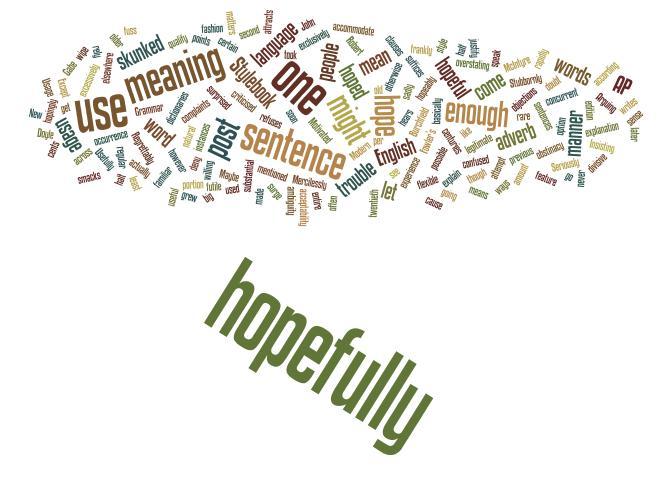Following up on Glossophilia’s earlier post on “hopefully” (Feb 11, 2012: https://glossophilia.org/?p=535), here’s an article* published on Tuesday in the Washington Post announcing the news that the AP stylebook has succumbed: it now supports the modern, colloquial, wider usage of “hopefully” as sentence modifier as well as adverb. ““Some have said that Strunk would excoriate us,” David Minthorn, AP’s deputy standards editor is quoted as saying in the piece. However, as John McIntyre – the Baltimore Sun editor and language blogger who lobbied for AP’s approval of the new ‘hopefully’ – pointed out: “English was created by barbarians, by a rabble of angry peasants, Because if it wasn’t, we would still be speaking Anglo-Saxon.” Hopefully, we’re better off with what we’ve got.
*Thanks, Damian, for the hat-tip.
AP’s approval of ‘hopefully’ symbolizes larger debate over language
By Monica Hesse, Published: April 17
The barbarians have done it, finally infiltrated a remaining bastion of order in a linguistic wasteland. They had already taken the Oxford English Dictionary; they had stormed the gates of Webster’s New World College Dictionary, Fourth Edition. They had pummeled American Heritage into submission, though she fought valiantly — she continues to fight! — by including a cautionary italics phrase, “usage problem,” next to the heretical definition.
Then, on Tuesday morning, the venerated AP Stylebook publicly affirmed (via tweet, no less) what it had already told the American Copy Editors Society: It, too, had succumbed. “We now support the modern usage of hopefully,” the tweet said. “It is hoped, we hope.”

(Jennifer S. Altman/FOR THE WASHINGTON POST) – “We batted this around, as we do a lot of things, and it just seemed like a logical thing to change,” says David Minthorn, the deputy standards editor of the Associated Press.
Previously, the only accepted meaning was: “In a hopeful manner.” As in, “ ‘Surely you are joking,’ the grammarian said hopefully.”
This is no joking matter.
“We batted this around, as we do a lot of things, and it just seemed like a logical thing to change,” says David Minthorn, the deputy standards editor of the Associated Press. “We’re realists over at the AP. You just can’t fight it.”
The reaction online was swift. Small, yes — but swift.
“Some have said that Strunk would excoriate us,” Minthorn says.
No! Not . . . not William Strunk Jr., beloved and deceased co-author of “The Elements of Style.” Not Him!
Yes, Him.
“Of course, I love that book,” Minthorn says regretfully.
For decades, “hopefully” has been caught in a struggle, a pillaged territory occupied by two opposing camps. “It has the longest run of controversy,” says Ben Yagoda, a writing professor and author of “When You Catch an Adjective, Kill It.” “It’s just become a symbol of this kind of argument.”
You know these kinds of arguments. You know them well. Linguistic battlefields are scattered with the wreckage left behind by Nauseated vs. Nauseous, by Healthy vs. Healthful, by the legions of people who perpetuated the union between “regardless” and “irrespective,” creating a Frankensteinian hybrid, “irregardless.”
These are the battles that are fought daily between Catholic school graduates, schooled in the dark arts of sentence diagramming and self-righteousness, and their exasperated prey. They are fought between prescriptivists, who believe that rules of language should be preserved at any cost, and descriptivists, who believe that word use should reflect how people actually talk.
“It was an unconscious mistake,” say the descriptivists.
“You mean subconscious.”
“Well, anyways — ”
“You mean anyway.”
“That begs the question. Why do you care about grammar so much?”
“No. It doesn’t! It doesn’t beg the question at all. It raises the question. It raises the question!”
“I’m going to beat you subconscious.”
It’s never about the words so much as about the world view — about believing in either the power of order or the inevitability of chaos, about the need for preservation or the need for progress. Prescriptivists are defenders of a dying faith, helicopter parents trying to keep the language in baby shoes while its feet are still growing.
As long as there have been words, words have changed. Our modern language is a mishmash of migrated semantics, full of uses that have drifted over centuries. Diligent grammarians might know that “momentarily” most correctly means “for a moment,” not “in a moment” — but do they realize that “explode” originally meant “reject,” that “handsome” once meant “easy to handle,” that “ludicrous” once meant “frivolous”? In the 1940s, it was considered vulgar to “contact” someone; respectable people knew that the correct use was “to make contact with.”
“There are terms that become shibboleths — markers of education and social class,” says John McIntyre, the Baltimore Sun editor and language blogger who was behind the “hopefully” push. “ ‘Hopefully’ is one of those. It was a harmless little adverb poking along for years and years” until people decided that it had to really mean something. Something beyond either “in a hopeful manner” or “it is hoped.”
Hopefully, a peace treaty will be reached regarding this new development.
After all, “English was created by barbarians, by a rabble of angry peasants,” McIntyre says. “Because if it wasn’t, we would still be speaking Anglo-Saxon.” Or worse, French.

